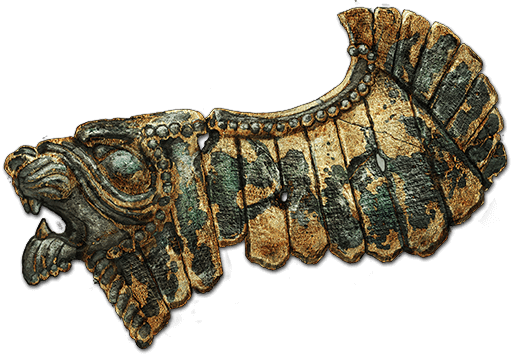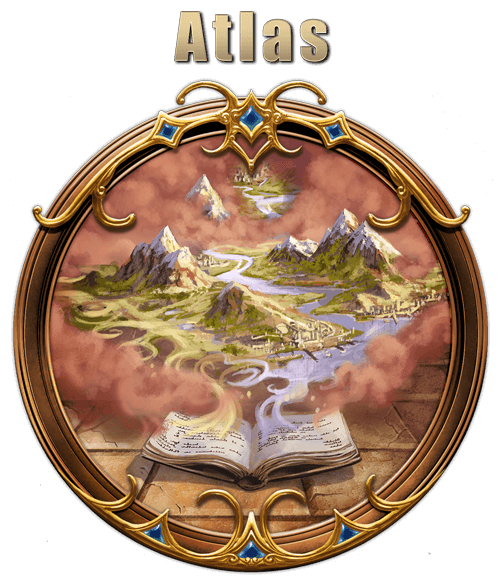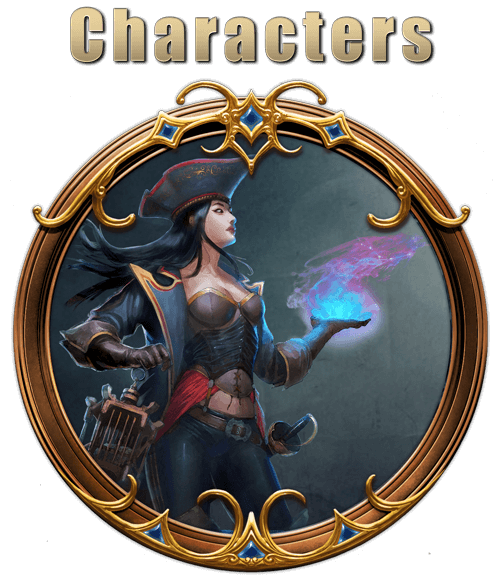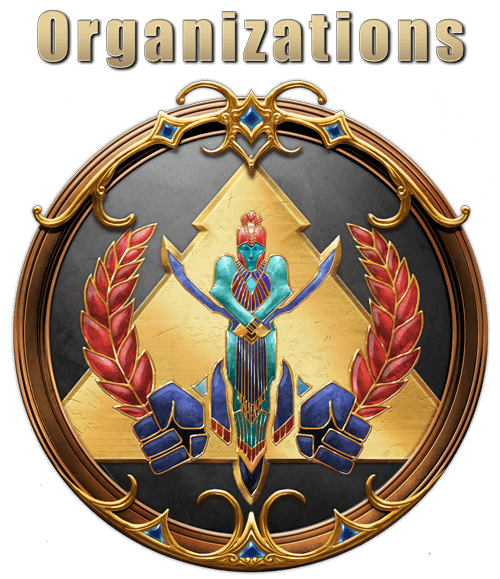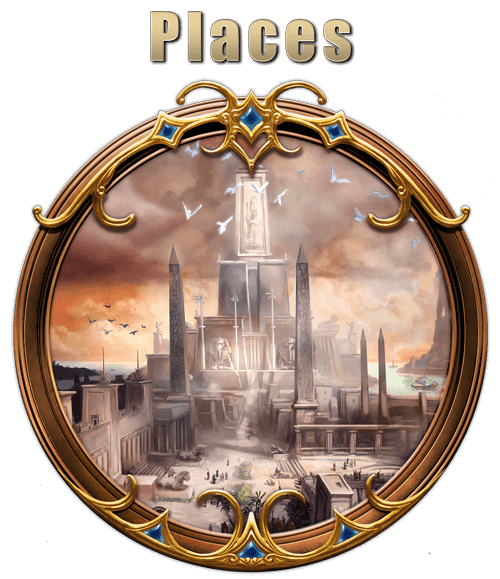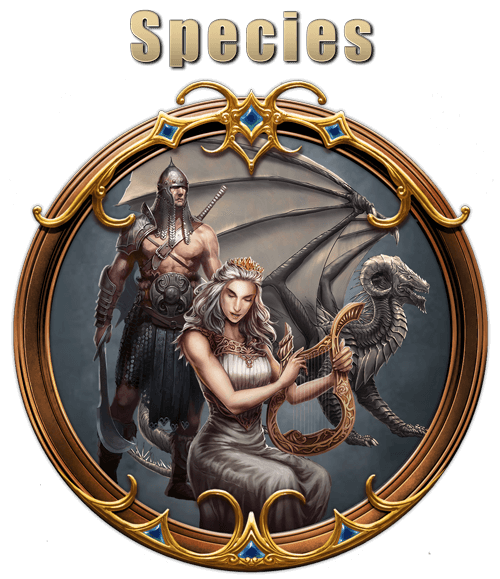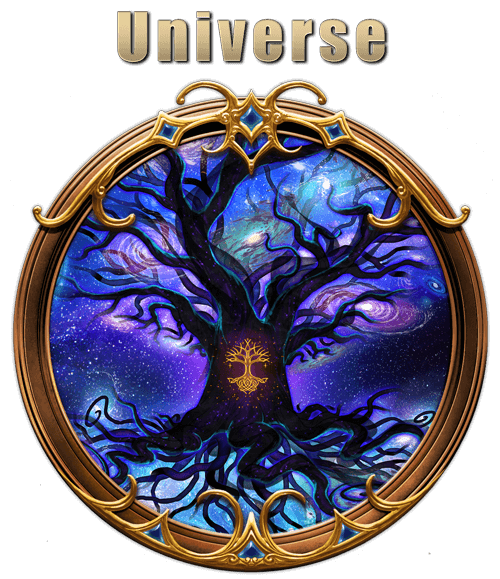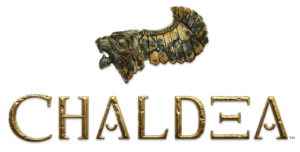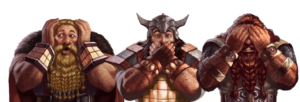G N A S H M A G
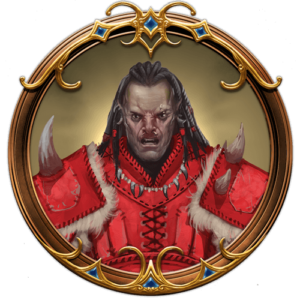 Gnashmag is a senior lieutenant in the Roughguts, an elite squad of orc shock troops that report directly to Marzahn.
Gnashmag is a senior lieutenant in the Roughguts, an elite squad of orc shock troops that report directly to Marzahn.
FISH AND OAR
Gnashmag grew up poor and destitute during the Dark Times in Fish Town, a small seaside fishing settlement along the southern coast of the Hills of Hatred. It’s difficult, if not impossible, to be precise about his date of birth; orc tribes rarely maintain clear and concise calendars, and among those that do, none lived in Fish Town.
He didn’t have parents, at least none that he could claim or who would claim him. In fact, none of the children of Fish Town did. Birthing Matrons assumed the task of bearing children, which they did at an alarming rate. Many died very young, however; those few who survived their first few dangerous years ran in packs together like animals and were collectively raised, for want of a better term, by wet nurses, childminders, and breeders.
Fish Town, as one might assume from the name, was an industrious village of orc fishers who survived on the lucrative bounty of the sea.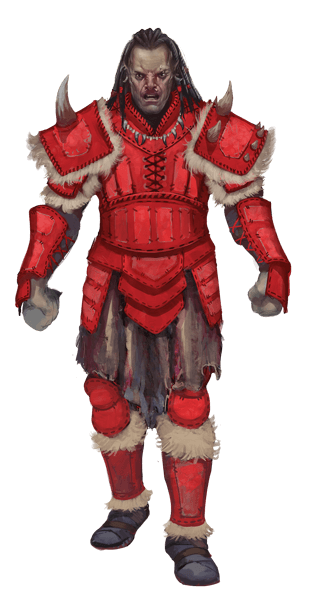 Gnashmag was young, strapping, and blessed with both a broad back and burly arms. Thus, when it came to choosing young ones for child labor, he and the other muscular youth (boys and girls alike) were assigned brutish oar duty. It proved to be a tedious and burdensome task, propelling the skiffs to and from the fishing grounds, but not a difficult one for the likes of Gnashmag.
Gnashmag was young, strapping, and blessed with both a broad back and burly arms. Thus, when it came to choosing young ones for child labor, he and the other muscular youth (boys and girls alike) were assigned brutish oar duty. It proved to be a tedious and burdensome task, propelling the skiffs to and from the fishing grounds, but not a difficult one for the likes of Gnashmag.
On one fateful early evening, he and the other rowers pushed their oars against the dock, shoving the skiff loaded to capacity with fishers into the bay. It was routine; there was nothing to distinguish it from any other night they’d gone out. Yet it would be the last time Gnashmag would see Fish Town. If he’d had a seer’s future sight or psionic precognition, no one could have guessed if he would have looked back fondly at his home or spit in its general direction, a defiant symbol of good riddance. As he had neither ability, the focus of both his mind and body were on the simple rhythm of rowing.
It was a chilly but clear fall night, fog just forming on the headlands, when Gnashmag and the other orc youth cut across shallow waves, ferrying a fresh crew of fishers out to Luggur.
Luggur was a large cargo scow the town used as a fishing platform. A few years earlier, Fish Town raiders had hijacked it from a nearby human settlement, but it was ultimately found to be too big and awkward for any practical use other than as a storage barge. So, with no easy way to propel it, it was relegated for use as a dedicated fishing platform.
The orcs had dragged Luggur out to sea and permanently anchored it at Fiskazgar (“fish garden” in the old orc dialect), and there it remained year round, frozen stiff in winter storms and baked hard during blistering summer heatwaves. Once Chief Togbone ordered Luggur be used as a fishing platform, the town suddenly prospered with ever-increasing harvests, making them the top fish exporter and the dominant orc village in the region. The secret to their success was simple: Fiskazgar itself was a submarine caldera formed by an extinct undersea volcano. Because of its hollow, shallow shape and abundant plant life and other vegetation, it was a natural fish paradise, a breeding ground, thriving with an explosion of diverse marine life that the orcs greedily harvested.
Prosperous though Fiskazgar was, it didn’t come without its own set of challenges—the orcs shared Fiskazgar with a wild kingdom of maritime animals and sea creatures. Most were benign, willing to ignore the fishing orcs as they went about their own business. There were sea birds great and small, seals, porpoises, and sometimes whales, all of which came to Fiskazgar to feed and rear their young, generally dismissive of the orcs. But with such an abundance of life came natural predators—primarily sharks but also giant eels, octopi, orcas, and the worst of all, sea serpents.
Most nights, fishing was tedious and predictable for the orcs. Those hours were filled with silence broken only by occasional banter as they busied themselves casting lines and nets hour after hour until their skiffs sat low in the water, heavy with bountiful fish. If they were particularly lucky, they would reach the limit to what their skiffs could carry, and they would return home early to reward themselves for their success with heavy drink and raucous recreation. Other times, fishing was slow and sparse; it seemed as if every fish in the sea had grown wise to their tricks and immune to their hooks and bait. But rather than giving in to despair and irritation, the tribe remained hopeful and spirited, enchanted by the magic of Fiskazgar.
Bountiful nights or lean times, the one constant for the fishers was that they always raced against the approaching morning when they would be forced to stop or risk the wrath of Sun.
“Sun hates Orc,” Chief Togbone reminded the fishers almost daily, emphasizing the need to return home before the dawn. “He spits on us with heat and blinding light. If you dally, he will broil your hide and dry your bones for soup.”
In truth, Togbone cared less for the fishers than he did for the fish they caught—he didn’t want their bounty spoiling in the day’s heat before the fishmongers could prepare the catch for market.
Gnashmag hated these rushed mornings most of all. Rowing home with their vessel partially full was bad enough, but adding further to their misery was the inevitable animosity and anger, as well as the threats and sharp whip strikes, of the seniors among them. All of this was meant to motivate and propel Gnashmag and the other rowers to greater effort, but it often just made them bitter and vengeful.
“Row, you ugly bastards!” a senior would shout between cracks of the whip. “Don’t let the Sun scorch us just because you’re lazy and slow. You want we should die out here?”
Just you, Gnashmag would think. No orc wanted to be stuck at sea with the sun beating down upon them. That was how malefactors were treated, banished into the open ocean to perish from thirst and torture by the light of day. But there were times he wished it happened more often to the self-important seniors among them.
On this particular night, the silver moon shone brightly, her noble features reflecting serenely off of Fiskazgar’s calm waters. For all the vile emotion orcs felt for Sun, they felt just the opposite for Moon—she was venerated, worshipped almost like a human god. The fishers looked forward to calm clear nights such as these, when Moon was alone in the sky and giving them her full attention. In these fair conditions, it took little effort to coax the fish into their nets. And they thanked Moon for this.
Gnashmag and the other rowers had done their duty of getting the fishers swiftly and safely to the Luggur platform; now they would spend the rest of the night supporting the fishers in whatever tasks were required.
Sunrise was still an hour away before its eye-piercing heat returned to torture them, and the fishers were exuberant with the night’s bountiful haul—each of their skiffs was packed to the gunwale with fat, succulent fish.
“Better than average,” Tarabi said to Gnashmag as she sized up the skiff, brimming with copper and brass Puppy Drum. Her black satin hair, usually pulled back neatly in braids, was wet and disheveled after the long night.
Gnashmag scoffed. “Better than average? Coming from you, that’s almost a compliment.”
He smirked and mocked her by smacking the fish lips of one of their dead catches.
In turn, she smacked Gnashmag hard on the ass as he turned away, grabbing a cheek in her clenched fist. “I meant your ass. Just a crack above average. But your face—?“
She pointed accusingly at him before gagging and hanging her head to spit into the sea. She faked a tremble before returning to the work of stowing the nets. He watched her intently, distractedly. He had known her for his entire life, and he knew most girls her age could not be bothered with the labor required to maintain long hair—it had become customary in Fish Town for the females to use their hair for braiding fishhooks. Most had short hair, but not Tarabi; she wore her long tresses with pride of a governing monarch. Her defiance of custom made her stand out against the other females in the settlement, and he often fought the desire to stroke her hair to see if it were as soft and smooth as it looked. To attempt to do so, he knew, would cost him teeth, genitals, or maybe even more.
Don’t prod a saber cat, he thought, or swim with sharks.
Tarabi was one and both. She was a shark that ate a saber cat but kept it alive within.
Gnashmag liked Tarabi more than he was willing to admit—even to himself and never out loud. Half the town expected Gnashmag to claim her or she him—a rare coupling in a small town where most adults preferred to remain solo and free. Further, while most orcs were dire and austere as death, Tarabi was once again different—she had a joke and a jape for most occasions. Even staring a deadly tempest in the teeth upon the open ocean, pulling hard on the oar in heavy swells, she’d find a way to make light of the situation. Here comes your birthing matron, she would howl at him as the storm closed in. I see she’s still not over what you did to her.
Once when a saber cat had snuck into town and snatched a sleeping toddler, she met it at the edge of town and wrestled the savage beast to submission, ultimately driving it off with nothing but a stick and raw determination. As a result of saving the child, she now bore wicked scars across her arms, legs, and face, which she proudly named the coochies.
When it came to rowing, Gnashmag and Tarabi always sat next to each other—no one dared try to separate the couple, especially after Stog—who had always been hot-blooded for Tarabi and never tired of trying to catch her eye or other body parts—wormed his way in next to her. The usurping of Gnashmag’s place hadn’t lasted long; Tarabi drove him into the floorboards with a sharp elbow to the teeth when he tried to nibble her ear. Toothless Stog remained thereafter, a powerful reminder to everyone that Gnashmag and Tarabi were as inseparable as Sun and Moon.
His ass still twitching from the roughness of her grip. Gnashmag jumped into the skiff and was getting the oars prepared for the long pull home when a bulbous head of an enormous elephant seal rose next to the boat, revealing itself with a burst of hot exhale, spraying Gnashmag with water and spittle. Its long ivory tusks thudded against the skiff’s side.
He stumbled back, startled, and fell over a bench, clocking the back of his head soundly on the rudder tiller. Imaginary Suns and Moons dance in his vision as he reeled, trying to find his feet again.
Elephant seals were regulars to Fiskazgar; seeing one was hardly a rare sight. Unless the orcs were hunting the mammoth creatures, there was room enough for all, and they’d leave each other be.
But today was different.
Dozens of the massive creatures appeared around the skiff, and then came more, hundreds perhaps.
Elephant seals, male and female, large and larger still, whisker-faced heads bobbed up and down, quickly encircled all of Luggur, pressing the skiffs dangerously tight against the barge, producing a dangerous strenuous creak and strain of planking ready to burst. They bawled to one another in long, yawning warnings.
“Look at all of ’em,” someone remarked, voice full of amazement and fear. Work on the barge ceased as the orc fishers, froze dumbstruck by the largest colony of elephant seals anyone had ever seen in memory, stared at the herd and one another. Someone else guessed there were five hundred easily, a thousand even.
“More?” another voice breathed.
Gnashmag had scrambled back to his feet and felt the hair on his neck stand tall—he could not distinguish fear from excitement.
If there are so many on the surface, he thought, how many more must there be below?
The vast colony moved like a single organism, as if it were some kind of Cthulhuian sea creature coming to Fiskazgar to reproduce into a plague that would dominate the Great Sea and destroy Chaldea before moving on to the next world. Stories of Cthulhuians in the Hills of Hatred were as plentiful as the orcs that lived there, and it was events like this that were probably the roots of those tales, Gnashmag suspected.
Soon Fiskazgar was filled past capacity, and still more of the seals were trying to get in. Luggur, which had once been a giant construction of human ingenuity, was dwarfed by the majesty of the natural world.
Tarabi frantically waved to Gnashmag.
“Give me your hand. Quickly!” she shouted as the skiff rocked and rose swiftly, propelled by the seething mass of blubber beneath the rolling sea’s surface.
He strained to reach her.
She clasped his hand in hers and dragged him to safety, hauling him to the center of the barge just as the skiff twisted sideways, turned, and flipped, dumping its cargo of fish. Hundreds of Puppy Drum fell into the drink, instant dinner for the hungry seals.
It was as if the dormant volcano beneath them had erupted. The colony, driven by hunger and an easy meal, rushed toward the barge.
“Unguu!” Tarabi swore loudly. “Everyone, back!”
The skiff exploded into splinters under the pressure as the seals lunged for their unexpected meal, fighting one another for position as they plowed forward like a wave themselves.
Gnashmag scanned the approaching dawn. It wasn’t long until Sun found them. “This isn’t good.”
“How are we going to get home?” someone cried, just as another skiff capsized, adding its load to the feeding frenzy.
“I don’t think any of us are getting home,” Gnashmag said. Even the gentlest creature, as elephant seals were said to be, could be dangerous and pose a serious threat to orcs in large numbers. It would be easy to be crushed to death, drowned, or accidentally consumed like a misshapen fish, dismantled from all sides.
“When you’re all dead,” Tarabi mused, “I’ll make a raft out of your corpses. Drink your blood and paddle home with your legs. I will survive this calamity.”
The ferociousness of the feeding frenzy had managed to clear out birds and other marine animals that enjoyed Fiskazgar, but the commotion caught the attention of a predator lurking in the deep recess of the caldera, dreaming of an elephant banquet.
It moved, unseen.
So far.
“Maybe if we cut the anchors free,” Gnashmag suggested, “the tide will carry us to shore.”
He was trying to imagine how they would get out of this mess. As much as he liked the idea of Tarabi floating on top of him, he’d prefer it be in life rather than death. His corpse, he decided, deserved the reward less than his body did.
“The sun will burn us alive,” one of the younger rowers whined.
Tarabi shoved that one away from her.
“To the devil with the sun,” she said. “Would you prefer to drown or—?”
Before she could finish, the caldera erupted a second time. A sea serpent, black with spiral turquoise bands, surged from the dark depths like a lightning bolt, shredding nine of the large seals at once in its massive maw, tearing seal flesh into minced meat and spraying blood skyward in a vivid, horrifying plume.
The colony of elephant seals moved at once—a single mind—desperate to escape the colossal serpent suddenly feeding on their colony.
In their panic to flee from the attacking serpent, the five-ton seals blind with their collective survival instinct, surged like an explosion in all directions. The Luggur, floating near the epicenter of the explosion, directly bore the force of the seal swelling. Frenzied now, seals dragged themselves onto it in search of refuge, and within seconds, dozens of the enormous beasts were on the barge, threatening to topple it seaward.
Terrified, Gnashmag, Tarabi, and others hurled their harpoons, piercing the seals in hopes of driving them off the faltering barge and back into the sea. Yet still more came—the waters churned with blood and foam as another thirty, another forty, more piled atop the Luggur. Seals, normally no danger to the fishers, crushed orcs under a stampede of rushing blubber and slashing tusks. And then the scow could take it no more, and then it upended—rolling slowly, like an elder dragon turning over in sleep. A loud crack and a tremendous crash shook them all, tossing elephant seal and orc alike into a burgundy sea of carnage as the sea serpent continued its voracious consumption of living flesh.
SUN AND SALT
Gnashmag startled awake with a jolt.
Curling turquoise waves crashed like the heart of the sea, each wave a pulse that pummeled him repeatedly in the face and slapped his ragdoll limbs about chaotically. His waterlogged, sunburnt carcass rocked violently with each rhythmic passing wave.
Groggy, coughing, and half-drowned, he raised his head above the waterline to take in his surroundings. The shallows of a sandy shoal. The heavy ocean currents had carried his unconscious body into a large lagoon, an estuary blanketed with giant four-foot-wide silver-gray oysters.
He struggled to rise and found his ankle and foot firmly wedged between two jagged oyster shells; he’d become anchored, the waves prevented from carrying him farther ashore to a nearby island.
His lungs burned fiercely, as if he’d just drunk hot liquid wax. He coughed, then gagged, and salt and green-brine bile spewed out of his mouth and nose as spasms of nausea shook his body.
He retched over and over again, his abdomen and chest convulsing until his guts tightened into a savage knot. Dry heaves squeezed his innards. The only thing left to expel were his lungs and guts—the searing pain meant only one thing: he would die with his intestines in his teeth.
Gnashmag remembered the harsh warnings he’d heard years early as he was preparing to be a rower for the fishers.
“Drink the sea and die,” Talldog, one of the senior fishers instructing the young rowers, had said. To demonstrate, two of the elder fishers had grabbed Gnashmag and roughly forced his face into the ocean and held him there.
“Drink! Drink or drown,” They had commanded. “Drink the salt water until your gut aches.”
Madchad and Boomka, a couple of the younger lads, had not survived the ordeal. They were unceremoniously drowned before the entire class. Talldog was indifferent to their deaths.
With no other choice, Gnashmag had done as he was told, drinking the sea water until his stomach was bloated as if he’d been dead for days. He then spent the next few miserable hours screaming for that death as he vomited up his innards.
However horrible that had been, it was a picnic with friends compared to what he endured now: the waves dashing his waterlogged body, scraping his blistered skin against razor-sharp clams, the blinding light and the thirst…the THIRST. He was so damned thirsty, he thought he would drink his own piss. Or even someone else’s. The insanity of the situation wasn’t lost on him—thirsty beyond reason while surrounded by endless water.
Is this death? he wondered; was this a bleak underworld meant to torture him through all time—persecuted by endless water, blinding light, salt, the overpowering stench of fish and sea…and the thirst. It was a brilliant torture, he had to concede. If he lived, he’d remember it for later use.
Drink the sea and die drink the sea and die drink the sea and die
Maybe he wasn’t dead, he hoped. I’m just delirious from salt poison and punch-drunk by the waves.
And the idiot voices in my head. I swear l’ll never get into another boat if it’s my last hope.
He dry-heaved, gagging on nothing but his tongue until he thought his eyes would pop from their sockets. Still, waves continued one after the other, battering him toward submission. He groaned and considered surrendering.
Suddenly the carnage on the barge returned in his mind like a whip strike—rotund elephant seals charging madly toward the barge and the skiffs, orcs running in terror, and the sea serpent coming for them all, devouring anything that was slower than itself. The crashing sounds of chaos and death, ones he would never forget.
He yanked his foot free and clamored upright, expecting to be suddenly confronted by the sea serpent, waiting to see if he was alive before eating him, but he discovered he was alone on a shallow sandbar. A few hundred paces distant rose a tiny islet against the stark, clear-blue sky. A single large banyan tree stood like a lone sentinel guarding nothing, a tuft of hair on a bald head.
Gnashmag did not recognize this place nor could he recall ever hearing of such a place. That meant little; it seemed to him like a most forgettable place.
How far had he floated? How long had he been unconscious? Was he even alive or was this an eternal afterlife? This certainly was not Dasha, the blood underworld, where orcs go when they die to have their blood mixed with their ancestors. This was like an empty chamber in the smallest of abandoned huts.
Was he in the belly of the sea serpent? Stranger things had happened in stories the childminders had told him. Maybe a sea nymph had saved him and delivered him here to her island home where she meant to eat him. Or, if he was lucky, have sex with him until he died. Better that than the sea serpent. If he had a choice, he would—
“Tarabi,” he shouted. The effort tore at his throat like jagged, dirty fingernails. “ANYONE!”
White seabirds drifted lazily in the hot wind above, calling back to Gnashmag’s frantic calls in their nonsense noises.
Oyster beds stretched in every direction for as far as the eye could gauge. Gnashmag stood, like a miniscule weed—a dandelion—struggling to survive on boulder-strewn windswept hills. But here, the boulders were oysters, the wind the waves.
The tiny islet, best he could guess, was surrounding by far-reaching sandy shoals like outstretched fingers—at least on this side of the island—and home to the biggest damn oysters he’d ever seen. Thousands of them. A remote eatery without customers, waiting to be discovered.
With the constant waves pounding against his back, Gnashmag slowly made his way to the island, careful to avoid the sharp oyster shells that clumped together in tangles.
When at last he made dry land, stumbling up the beach amid the crashing waves, he fell exhausted to white sand, happy to be out of the salt and the wet, even if it meant utter isolation.
He stretched his eyes against the blinding light of day, searching the distant horizon for land, ship, or possibly even the Luggur. Any sign of life at all would be welcome. But there was none to be seen. Nothing but water, rising and falling as if the sea were breathing.
And the Sun.
He was alive, but lost somewhere in the Great Sea, far from orc and home, and closer to the Sun than he’d ever expected to be.

C H A P T E R O G R A P H Y
S E A S O N 1 . 1
Chapter 7
War Council
S E A S O N 1 . 2
Chapter 11
Hatred of Chaldea
Chapter 14
Gravers of Chaldea
P E R S O N A L D E T A I L S
LIFE STATISTICS
Orc
POSITION/TITLES
Roughguts Lieutenant
R E L A T I O N S H I P S
PERSONAL
Blood Sisters
Ganc
Gizette
Marzahn
ORGANIZATIONS
Kingdom of Niesse
The Roughguts
C H A L D E A P E D I A

